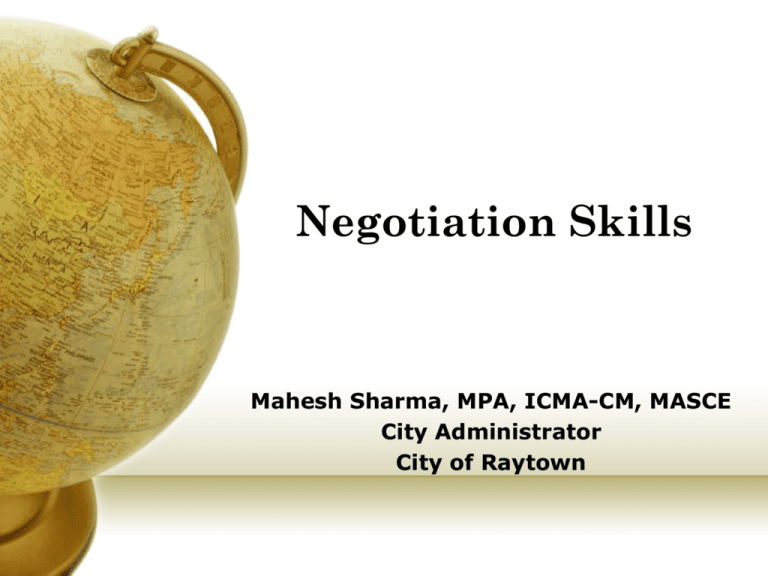Cultural Awareness and Customer Service
advertisement

Negotiation Skills Mahesh Sharma, MPA, ICMA-CM, MASCE City Administrator City of Raytown Learning Objectives Understand the purpose and importance of negotiation What are the different phases of negotiations Specific skills and techniques of negotiating Create mutually beneficial outcomes Develop and improve your negotiation skills What is negotiation? Negotiation is back and forth communication designed to reach agreement while leaving the other side intact and positive Negotiating Use Creativity Persuasive communication or bargaining. “Negotiation about getting the best possible deal in the best possible way.” You negotiate everyday Negotiations • • • • • • Discipline Process Relentlessness Consistency Practice Routine It is NOT an in-born talent Bargaining “I want the fruit!” “I want the peel!” Benefits of Good Negotiation Career success Efficiency Achieving your goals Help you make deals Solve problems Manage conflicts Working relationship Preserve relationships Interpersonal Skills Avoider: dislikes conflicts Compromiser: fair-minded people interested in maintaining relationships Accommodator: resolve interpersonal conflicts by resolving the other person’s problem Competitor: winning is the main thing Problem-Solver: seeks to find the underlying problem, use brainstorming to solve Qualities of a Skilled Negotiator Knows how to build relationships Can identify people’s needs effectively Is able to recognize shared interests Both sides can claim victory Learn from each experience Top 10 Needs For Negotiations 1. Prepare rigorously. 2. Build trust and rapport. 3. Exchange information & listen. 4. Identify things of unequal value & trade them. 5. Grow the pie before dividing it. 6. Claim the slice you deserve. 7. Know thyself. 8. Understand power and when to use it. 9. Coalitions. 10. Don’t be evil. Prepare Rigorously Preparation Checklist Research the people and situation. Build relationships with the other side. Know your priorities & how much you value each. Build a decision tree. Role play the debate. Write a script for tough situations. Draft, Devil’s Advocate, Deliver (3 D’s). Know your BATNA – Best Alternative To A Negotiated Deal and goal. Build Trust and Rapport • • • • • People need to like you. Ways to communicate. Preserve relationships. Quick wins. Frame the negotiation as a team problem-solving exercise. Deals happen because of people Exchange Information & Listen Identify things of unequal value & trade them Find out what they want. Try to give it to them in exchange for what you want. Ask open-ended questions to get good information. Connect what you hear to what you know. Never assume! Follow up to test your understanding. Don’t be afraid to talk about what’s most important to you. If you are unclear, ask or involve an expert. Grow the pie before you cut it The Pie = The benefit you both get by working together beyond what you both could’ve gotten by working alone. Claim what you deserve! Aim for the high side of reasonable. Don’t be afraid to ask. Unreasonable offers can create ill-will. Know when not to ask or when to stop. Leave room In multi-party negotiations, timing is key Know Thyself What are my strengths? What are my Weaknesses? Understand sources of power & know when to use it In negotiations, power is how much value you bring to the other party relative to how much value they bring to you Coalitions Form Anticipate Don’t Deceive Everyone has different values. Some negotiators will be more ethical than others. Take the high road by taking the high road. Factors for success Legitimacy of your case Confidence in presenting it Courtesy to the other party Adaptation to the other party’s style Rapport Incentives and trade offs Research the bigger picture Why Negotiation Fails? Not preparing enough. Fixating on price not on deal. Trying only to find common ground. Negotiating one issue at a time. Try to answer every question. Anchoring yourself with a low offer. Not willing to walk away at your BATNA. Saying yes too quickly. Letting emotion take over. Not knowing when to stop asking. Summary • Negotiation is a way to settle difference while maintaining and improving relationships • Good negotiation skills are important to your career success • The ultimate goal of any negotiation is to reach an agreement that benefits both parties • When you negotiate, remember to separate people from problems and focus on interests, not positions • To become a better negotiator, think about your successes and failures, and learn from your mistakes GO FORTH AND NEGOTIATE The greatest failure in negotiation is failing to negotiate “THANK YOU”






